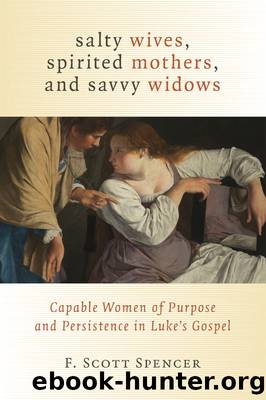Salty Wives, Spirited Mothers, and Savvy Widows by Spencer F. Scott;

Author:Spencer, F. Scott;
Language: eng
Format: epub
Publisher: Wm. B. Eerdmans Publishing Co.
In the center of this larger unit, the foreign-female monarch of the South defies ethnic-gender stereotypes and stands out, in contrast to and condemnation of many Israelites of âthis evil generation,â as a blessed hearer (akouÅ) of Godâs word (11:27-28, 31)75 and receptor of Godâs Wisdom (Sophia [11:31, 49]). Likewise, she also holds center stage with Solomon in the narrower unit of 11:30-32, flanked by Jonah and the male Ninevites.
Jonah/Ninevites (11:30)
For just as Jonah became a sign to the people of Nineveh (tois Nineuitais), so the Son of Man will be to this generation.
Solomon/Queen of South (11:31)
The queen of the South will rise at the judgment with the people of this generation and condemn them, because she came from the ends of the earth to listen to the wisdom of Solomon, and see, something greater than Solomon is here!
Jonah/Ninevites (11:32)
The people/males of Nineveh (andres Nineuitai) will rise up at the judgment with this generation and condemn it, because they repented at the proclamation of Jonah, and see, something greater than Jonah is here!
Jesusâ opening statement in 11:29 to the sign-seeking crowds that âno sign will be given . . . except the sign of Jonahâ leads us to expect the primacy of Jonahâs example in what follows. But Lukeâs exclusive focus on the Ninevitesâ response to Jonahâs preaching â with no mention of Jonahâs three-day-and-night ordeal foreshadowing the Son of Manâs death-and-resurrection (Matt 12:40) â sandwiched around the queenâs meeting with Solomon (which she initiates!), intimates that her story is equal to, if not greater than, Jonahâs story in importance. This generation must not miss the sign of her impending ârise in judgmentâ against it.
The framework in Luke 11:29-32 of male-female, Jew-Gentile juxtapositions in prophetic-monarchical contexts recalls similar arrangements in Jesusâ Nazareth speech. But the particular situations of the Sidonian widow and Southern queen are also distinctive at various points, not least pertaining to their geographical and social locations. We now turn to profile the queen more fully in dimensions of time/space and class/character.
Download
This site does not store any files on its server. We only index and link to content provided by other sites. Please contact the content providers to delete copyright contents if any and email us, we'll remove relevant links or contents immediately.
| Exegesis & Hermeneutics | New Testament |
| Old Testament |
The Five People You Meet in Heaven by Mitch Albom(3561)
The Secret Power of Speaking God's Word by Joyce Meyer(3180)
Real Sex by Lauren F. Winner(3014)
Name Book, The: Over 10,000 Names--Their Meanings, Origins, and Spiritual Significance by Astoria Dorothy(2978)
The Holy Spirit by Billy Graham(2944)
0041152001443424520 .pdf by Unknown(2843)
How The Mind Works by Steven Pinker(2813)
ESV Study Bible by Crossway(2773)
Ancient Worlds by Michael Scott(2682)
Churchill by Paul Johnson(2578)
The Meaning of the Library by unknow(2565)
The ESV Study Bible by Crossway Bibles(2550)
The Gnostic Gospels by Pagels Elaine(2527)
MOSES THE EGYPTIAN by Jan Assmann(2412)
Jesus by Paul Johnson(2352)
City of Stairs by Robert Jackson Bennett(2347)
The Complete Dead Sea Scrolls in English (7th Edition) (Penguin Classics) by Geza Vermes(2277)
The Nativity by Geza Vermes(2226)
Ancient Near Eastern Thought and the Old Testament by John H. Walton(2223)
